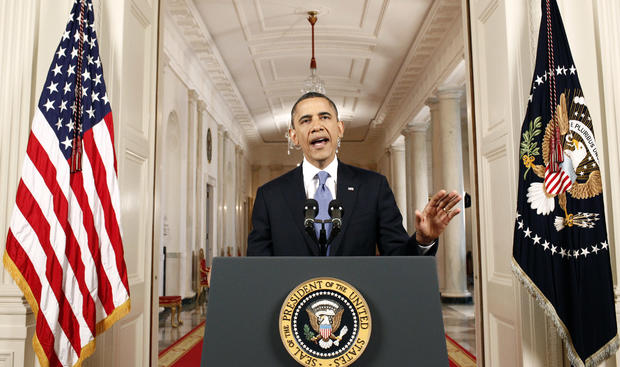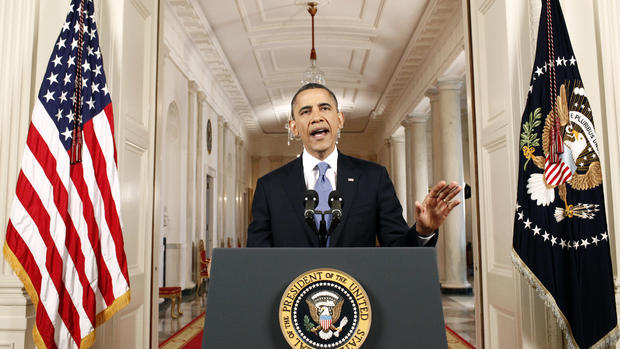Did Obama just get his mojo back?
This post originally appeared on Slate.
President Obama's campaign team can come up from the root cellar. The summer health care tornado did not land. The Supreme Court ruled the Affordable Care Act is constitutional, protecting the president's signature legislative achievement. The decision was authored by conservative darling Chief Justice John Roberts, suggesting that, politically at least, this seal of approval was affixed by Betty Crocker herself.
If the law had been struck down in whole or in large parts, it would have endorsed Mitt Romney's claim that President Obama committed a double sin: He wasted the precious start of his presidency on a wrong-headed scheme while ignoring a weak economy. But what now? Just because the Supreme Court upheld the law doesn't mean the legislation is popular. The president avoided a big defeat, but Mitt Romney's conservative base is energized. The net result is that it was a good day politically for the president, but it's a small net.
If President Obama wanted to claim it, he could argue that this legal victory gives him back some of his 2008 mojo. When he signed the law in March of 2010, Obama made broad claims for it:
Today, we are affirming that essential truth--a truth every generation is called to rediscover for itself--that we are not a nation that scales back its aspirations. We are not a nation that falls prey to doubt or mistrust. We don't fall prey to fear. We are not a nation that does what's easy. That's not who we are. That's not how we got here. We are a nation that faces its challenges and accepts its responsibilities. We are a nation that does what is hard. What is necessary. What is right. Here, in this country, we shape our own destiny. That is what we do. That is who we are. That is what makes us the United States of America.
The president echoed some of that sentiment Thursday after the ruling. "It should be pretty clear by now that I didn't do this because it was good politics," he said in the East Room of the White House, where he had signed the legislation two years earlier. "I did it because I believed it was good for the country. I did it because I believed it was good for the American people." The president mentioned politics 10 times in the short speech, always putting himself at arm's length from that dirty business. You may remember that was his posture in the 2008 campaign. He then launched into a story, as he did so effectively as a candidate, explaining how he carried with him the letter of a woman named Natoma Canfield who was driven to drop coverage because it was too expensive.
And now that he's said this, he's going to move on from this issue. Fast. "What we won't do--what the country can't afford to do--is refight the political battles of two years ago or go back to the way things were," said Obama. The president once said he welcomed a fight over health care, but he doesn't want one now. Obama aides expect and hope that Republicans will want to make the election a fight over health care, but their view is that the country does not want to go through a health care fight again. They compare the situation to the contentious Bush v. Gore ruling; liberals wanted to fight another round, but the country wanted to move on.
Watch CBS News' special report in the video to the left.
If Obama does not embrace his victory, it will make a tidy parallel with Mitt Romney: two politicians whose signature legislation was reforming health care based on an individual mandate, both of whom would like to talk about something else.
Will Mitt Romney start talking more about health care now? Conservatives would like the 2012 election to be about the Affordable Care Act. This will test Rick Santorum's contention that Mitt Romney can't argue against the ACA because of his Massachusetts health care plan. Romney in a statement after the ruling promised to work for the defeat of the president's version from his first day in office. He issued a fundraising appeal to conservatives talking about the threat to liberty. His campaign boasts that in the immediate aftermath of the ruling, they raised $1 million.
Recent polling suggests that Romney might not benefit significantly outside his core constituents. It's clear that the ruling will help him with conservatives. The Affordable Care Act helped galvanize Tea Party activists in 2010. Now the only way the law can be defeated is if Mitt Romney is elected. In a recent CBS poll, 70 percent of Tea Party voters said they wanted to overturn the law. But outside that group of activists, the opposition to the law doesn't look passionate enough to drive a big group of voters. Overall, 37 percent of voters in the CBS poll think the law went too far, 27 percent think the law didn't go far enough, and another 25 percent think it's about right. That's a small base of voters for Romney to work from; he's already got most of them (84 percent of this group are either Tea Party or Republicans); and anyone who doesn't like the law but isn't already voting for Mitt Romney isn't going to be swayed just by a Supreme Court ruling. Of course this is polling before the fact. Things could change.
Watch CBS News' special report in the video to the left.
Mitt Romney will have to make the case against health care reform with more specifics if he is to pick up more votes than he gets by merely giving it the big thumbs down. That means he'll have to engage the issue in a way he has not before. Mere assertion won't do if he's trying to convince voters that they should lose all of the benefits President Obama cites--the millions with coverage who would previously have been denied, the seniors with expanded Medicare coverage, those who are protected from insurance companies who might have dropped them before the law was passed.
If Gov. Romney is going to do that, he'll have to propose an alternative. That may be turf more favorable to the president. Twice in Romney's statement responding to the ruling, he said, "This is a choice" when talking about the electoral conditions created by the court's action. The president has been trying to get people to see the election as a choice for months--a choice between two candidates and their plans is preferable than a referendum on his record.
Right now, according to the latest Pew poll, voters say they are about evenly divided on which candidate they trust to handle the issue of health care. If Mitt Romney can convince voters that health care is an economic issue, he'll be fighting on his turf. The Pew poll shows that by an 8-point margin, voters trust him to handle the economy over Obama. Romney could use Roberts' argument that the individual mandate is a tax (and not a penalty) against the president as a part of his larger argument that Obama is an old-style liberal who will raise your taxes. The peril of that approach, though, is that it will lead to a debate about Romney's use of tax penalties as governor of Massachusetts.
If voters see health care as a matter of which candidate will look out for them, then Obama has the advantage. He leads Romney by 31 points in the latest Pew poll when respondents were asked, "Who connects more with ordinary Americans?"
In this fight, the president may have an unlikely ally in Chief Justice Roberts. By upholding the law and authoring the decision, he lent an extra measure of validation. According to a recent CBS poll, 76 percent of the country thinks Supreme Court justices make their decisions based on politics. If that were true, John Roberts would have ruled against the president. Since he didn't, it could suggest wider approval than if Obama had won with a 5-4 majority signed by Justice Kennedy. Robert's role led to an outcry from conservatives like Sarah Palin, Red State's Erick Erikson, and Rep. Jack Kingston, who Tweeted that after the ruling he was no longer friends with John Roberts. Perhaps the chief justice should head down the root cellar until this thing clears.


